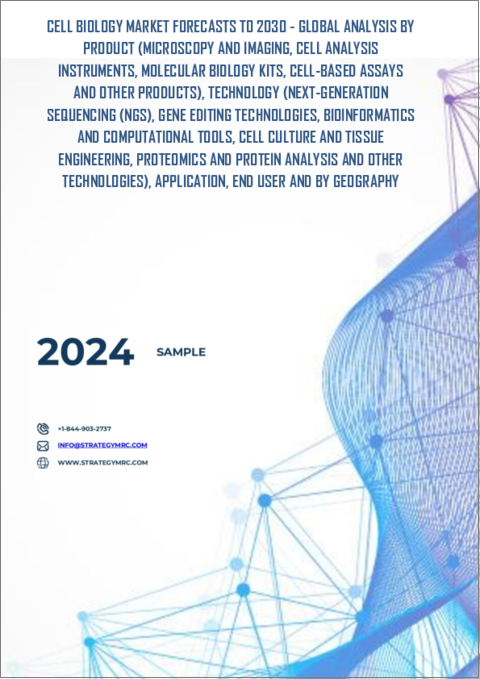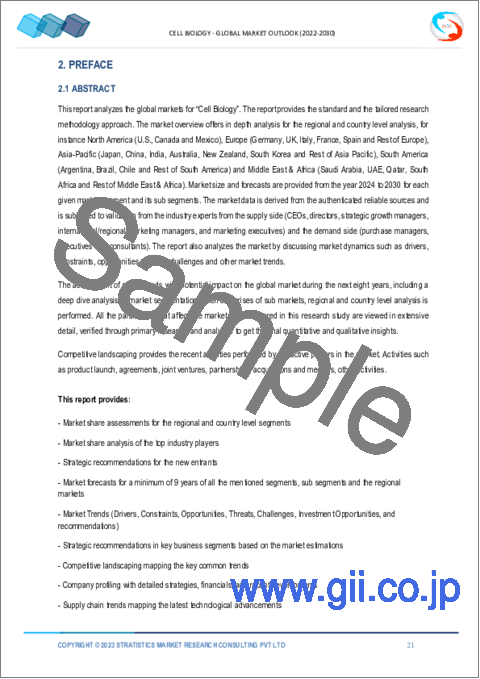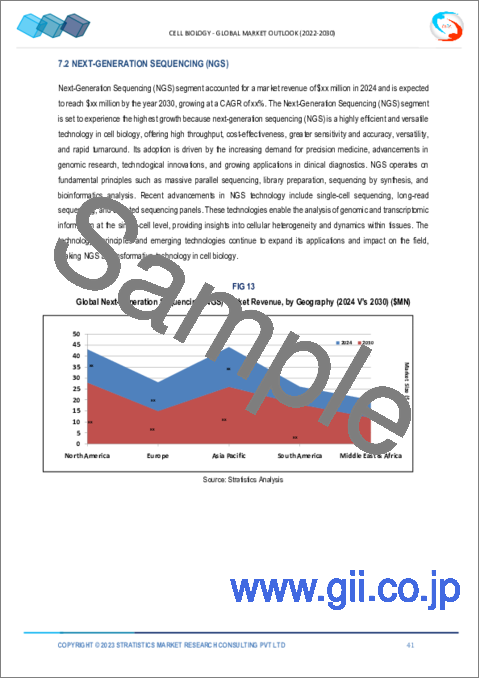|
|
市場調査レポート
商品コード
1383375
セルバイオロジー市場の2030年までの予測:製品別、技術別、用途別、エンドユーザー別、地域別の世界分析Cell Biology Market Forecasts to 2030 - Global Analysis By Product, Technology, Application, End User and By Geography |
||||||
カスタマイズ可能
|
|||||||
| セルバイオロジー市場の2030年までの予測:製品別、技術別、用途別、エンドユーザー別、地域別の世界分析 |
|
出版日: 2023年11月01日
発行: Stratistics Market Research Consulting
ページ情報: 英文 200+ Pages
納期: 2~3営業日
|
- 全表示
- 概要
- 図表
- 目次
Stratistics MRCによると、世界のセルバイオロジー市場は2023年に206億米ドルを占め、予測期間中のCAGRは16.2%で成長し、2030年には590億米ドルに達すると予測されています。
生命の基本構成要素である細胞を研究する科学分野はセルバイオロジーと呼ばれ、細胞学と呼ばれることもあります。生物に見られる最小の自律体である細胞は、その形態、機能、行動の観点から研究されます。さらにセルバイオロジーは、細胞の発生、分裂、コミュニケーション、外界との接触を制御する複雑なプロセスを探求します。代謝、DNA複製、遺伝子発現、細胞シグナル伝達システムなどの調査も含まれます。
GLOBOCANによると、2020年のがん罹患者数1,930万人、がん死亡者数1,000万人から、2040年には3,000万人近くまで増加すると予想されています。
政府の資金援助と支援
セルバイオロジーの研究は、科学的発見、医学的進歩、バイオテクノロジー開発を促進するために、政府による資金援助と支援が必要です。さらに、研究努力の支援、最先端機器の購入、科学者の雇用のために、政府は学術機関、研究センター、バイオテクノロジー企業に資金を提供しています。さらに、基本的な細胞プロセスのより深い理解、最先端のバイオテクノロジー製品の開発、セルバイオロジー的発見の加速はすべて、このような財政支援によって可能となります。さらに、政府の監視や倫理規則も、セルバイオロジー研究が倫理的、法的、安全基準に細心の注意を払いながら倫理的に実施されることを保証し、最終的に社会全体に利益をもたらすことで、市場規模を押し上げています。
高額な費用と特許問題
セルバイオロジーの調査には、高価な機器、試薬、専門知識が必要です。さらに、特に資金力の乏しい小規模の研究機関やグループにとっては、セルバイオロジーの実験を行い、必要な機器や消耗品を購入するための高額な費用が、資源へのアクセスを妨げる可能性があります。さらに、セルバイオロジーの製品や技術の開発や商業化は、知的財産権や特許紛争によって妨げられる可能性があります。さらに、セルバイオロジーの研究分野によっては、法的な複雑さや所有権に関する争いが原因で、研究の遅れや経済的損失が発生することもあります。その結果、これらの要因が市場規模にマイナスの影響を与える可能性があります。
新たな革新的ツールと技術
技術開発の結果、セルバイオロジーの研究と応用は変化しています。高解像度顕微鏡、シングルセルシーケンス、CRISPR-Cas9のような遺伝子編集プラットフォームはすべて、細胞がどのように機能するかについての我々の理解を一変させました。さらに、これらのツールの支援により、研究者はかつてないほど深く細胞を調査することができ、遺伝学、がん研究、再生医療、創薬の分野に革命をもたらした複雑な分子プロセスを明らかにすることができます。さらに、自動化とビッグデータ解析によって可能になった実験とデータ処理の合理化によって、発見のスピードも加速しています。そのため、セルバイオロジーにおける技術の進歩は知識の境界を広げ、健康上の課題を解決する可能性を秘めており、市場の拡大を後押ししています。
標準化と熟練した専門家の不足
セルバイオロジー研究では、複雑なプロトコールや技術が使用されるため、ばらつきが生じ、再現性が困難になることが多いです。さらに、標準化されていない手順や実験環境の違いにより、結果の信頼性や比較可能性が妨げられる可能性があり、この分野全体の進歩に悪影響を及ぼす可能性があります。さらに、セルバイオロジーの特定の分野では有能な専門家が不足しているため、研究や業界の成長速度が鈍化する可能性があります。
COVID-19の影響
COVID-19の大流行の結果、セルバイオロジー研究は多くの障害に見舞われています。一時的な閉鎖、研究室への立ち入りの制限、研究者数の減少など、世界各地の研究室が混乱に見舞われています。さらに、進行中の実験やデータ収集の遅れや困難を引き起こし、セルバイオロジーの研究を遅らせています。さらに、COVID-19調査は他の研究分野よりも多くの時間、資金、スタッフを費やし、セルバイオロジーの進歩を遅らせています。共同研究、アイデアの共有、科学的進歩はすべて、渡航制限や社会的距離短縮政策による制約によって妨げられてきました。そのため、セルバイオロジー研究の正常な運営と進歩は、一般にパンデミックによって著しく妨げられています。
予測期間中、分子生物学キット分野が最大になる見込み
分子生物学キット分野は、生物学的分子の分子解析や分子操作を目的とした幅広い試薬キットや器具がすでに準備されていることから、最大のシェアを占めると推定されます。これらのツールは、DNAやRNAの抽出、PCR、遺伝子発現解析、DNAシーケンシングなど、多くの分子生物学的手順に必要です。これらのツールは、研究室のオペレーションを合理化・簡素化することで、研究者が正確かつ迅速に検査を実施することを容易にします。分子生物学キットは、分子研究へのアクセスを容易にし、遺伝子、ゲノム、個別化医療研究を促進することで、この分野を変革し、細胞機能とそれらが健康や病気にどのように影響するかについての理解を進めてきました。
予測期間中、遺伝子編集技術分野のCAGRが最も高くなる見込み
遺伝子編集技術分野は、生物のDNAを正確に操作できる強力なツールや技術により、予測期間中にCAGRが最も高くなると予測されています。さらに、一般的な手法には、TALEN、ジンクフィンガーヌクレアーゼ、CRISPR-Cas9が含まれます。遺伝子機能の調査、遺伝子異常の治療、研究・治療目的の遺伝子改変生物の作出のために、これらの技術は遺伝子の特定の改変を可能にします。さらに、さまざまな生物学的プロセスの根底にある分子メカニズムについて、これまでは得られなかった洞察が得られ、遺伝性疾患の治療やバイオテクノロジー応用の進歩に大きな期待が寄せられています。したがって、これらの要因が市場拡大を大きく後押ししています。
最大のシェアを持つ地域
アジア太平洋地域は、ヘルスケアと研究開発のためのインフラ整備が主な目的であるため、予測期間中に最大の市場シェアを占めました。さらに、セルバイオロジー研究はオーストラリア国立保健医療研究評議会(National Health and Medical Research Council of Australia)から資金援助を受けており、インドのバイオテクノロジー省(Department of Biotechnology)はセルバイオロジー研究イニシアチブに資金援助と支援を行っています。さらに、これらのプログラムは科学的能力を高め、才能を引き出し、最先端のセルバイオロジー技術の開発を奨励し、最終的にはヘルスケアを向上させ、経済成長を促進し、アジア太平洋を後押しすることを目指しています。
CAGRが最も高い地域:
北米は予測期間中CAGRが最も高くなると予想されます。この地域は最先端の研究の中心地として機能しており、複数の大学、研究所、バイオテクノロジー企業が細胞研究と技術革新の基準を設定しています。さらに、この地域は個別化医療、幹細胞研究、遺伝子編集技術の開発に不可欠であり、これらの技術は疾病の理解を進め、革新的な治療法の創出につながっています。さらに、この健全なエコシステムは、科学的理解を深めるだけでなく、世界のセルバイオロジー市場の成長と競合を大きく後押ししています。
無料のカスタマイズサービス
本レポートをご購読のお客様には、以下の無料カスタマイズオプションのいずれかをご利用いただけます:
- 企業プロファイル
- 追加市場プレイヤーの包括的プロファイリング(3社まで)
- 主要企業のSWOT分析(3社まで)
- 地域セグメンテーション
- 顧客の関心に応じた主要国の市場推計・予測・CAGR(注:フィージビリティチェックによる)
- 競合ベンチマーキング
- 製品ポートフォリオ、地理的プレゼンス、戦略的提携に基づく主要企業のベンチマーキング
目次
第1章 エグゼクティブサマリー
第2章 序文
- 概要
- ステークホルダー
- 調査範囲
- 調査手法
- データマイニング
- データ分析
- データ検証
- 調査アプローチ
- 調査ソース
- 1次調査ソース
- 2次調査ソース
- 前提条件
第3章 市場動向分析
- 促進要因
- 抑制要因
- 機会
- 脅威
- 製品分析
- 技術分析
- アプリケーション分析
- エンドユーザー分析
- 新興市場
- 新型コロナウイルス感染症(COVID-19)の影響
第4章 ポーターのファイブフォース分析
- 供給企業の交渉力
- 買い手の交渉力
- 代替品の脅威
- 新規参入業者の脅威
- 競争企業間の敵対関係
第5章 世界のセルバイオロジー市場:製品別
- 顕微鏡検査と画像処理
- 電子顕微鏡
- 蛍光顕微鏡
- 細胞解析機器
- 分子生物学キット
- 細胞ベースのアッセイ
- その他の製品
第6章 世界のセルバイオロジー市場:技術別
- 次世代シーケンス(NGS)
- 遺伝子編集技術
- バイオインフォマティクスと計算ツール
- 細胞培養と組織工学
- プロテオミクスとタンパク質分析
- その他の技術
第7章 世界のセルバイオロジー市場:用途別
- 神経科学
- 免疫学
- 幹細胞調査
- 遺伝学とゲノミクス
- 細胞療法と免疫療法
- ウイルス学
- その他の用途
第8章 世界のセルバイオロジー市場:エンドユーザー別
- 受託調査機関(CRO)
- 学術研究機関
- 病院とヘルスケア提供者
- 臨床検査室
- 製薬会社およびバイオテクノロジー会社
- 幹細胞および再生医療企業
- その他のエンドユーザー
第9章 世界のセルバイオロジー市場:地域別
- 北米
- 米国
- カナダ
- メキシコ
- 欧州
- ドイツ
- 英国
- イタリア
- フランス
- スペイン
- その他欧州
- アジア太平洋地域
- 日本
- 中国
- インド
- オーストラリア
- ニュージーランド
- 韓国
- その他アジア太平洋地域
- 南米
- アルゼンチン
- ブラジル
- チリ
- その他南米
- 中東とアフリカ
- サウジアラビア
- アラブ首長国連邦
- カタール
- 南アフリカ
- その他中東とアフリカ
第10章 主な発展
- 契約、パートナーシップ、コラボレーション、合弁事業
- 買収と合併
- 新製品の発売
- 事業拡大
- その他の主要戦略
第11章 企業プロファイル
- Novartis
- Pfizer
- HiMedia Laboratories
- BD Biosciences
- Thermo Fisher Scientific
- GE Healthcare Life Sciences
- Vertex Pharmaceuticals
- Qiagen
- Illumina
- Bio-Rad Laboratories
- Lonza Group
- Amgen
- Roche
- Johnson & Johnson
- PerkinElmer
List of Tables
- Table 1 Global Cell Biology Market Outlook, By Region (2021-2030) ($MN)
- Table 2 Global Cell Biology Market Outlook, By Product (2021-2030) ($MN)
- Table 3 Global Cell Biology Market Outlook, By Microscopy and Imaging (2021-2030) ($MN)
- Table 4 Global Cell Biology Market Outlook, By Electron Microscopes (2021-2030) ($MN)
- Table 5 Global Cell Biology Market Outlook, By Fluorescence Microscopes (2021-2030) ($MN)
- Table 6 Global Cell Biology Market Outlook, By Cell Analysis Instruments (2021-2030) ($MN)
- Table 7 Global Cell Biology Market Outlook, By Molecular Biology Kits (2021-2030) ($MN)
- Table 8 Global Cell Biology Market Outlook, By Cell-based Assays (2021-2030) ($MN)
- Table 9 Global Cell Biology Market Outlook, By Other Products (2021-2030) ($MN)
- Table 10 Global Cell Biology Market Outlook, By Technology (2021-2030) ($MN)
- Table 11 Global Cell Biology Market Outlook, By Next-Generation Sequencing (NGS) (2021-2030) ($MN)
- Table 12 Global Cell Biology Market Outlook, By Gene Editing Technologies (2021-2030) ($MN)
- Table 13 Global Cell Biology Market Outlook, By Bioinformatics and Computational Tools (2021-2030) ($MN)
- Table 14 Global Cell Biology Market Outlook, By Cell Culture and Tissue Engineering (2021-2030) ($MN)
- Table 15 Global Cell Biology Market Outlook, By Proteomics and Protein Analysis (2021-2030) ($MN)
- Table 16 Global Cell Biology Market Outlook, By Other Technologies (2021-2030) ($MN)
- Table 17 Global Cell Biology Market Outlook, By Application (2021-2030) ($MN)
- Table 18 Global Cell Biology Market Outlook, By Neuroscience (2021-2030) ($MN)
- Table 19 Global Cell Biology Market Outlook, By Immunology (2021-2030) ($MN)
- Table 20 Global Cell Biology Market Outlook, By Stem Cell Research (2021-2030) ($MN)
- Table 21 Global Cell Biology Market Outlook, By Genetics and Genomics (2021-2030) ($MN)
- Table 22 Global Cell Biology Market Outlook, By Cell Therapy and Immunotherapy (2021-2030) ($MN)
- Table 23 Global Cell Biology Market Outlook, By Virology (2021-2030) ($MN)
- Table 24 Global Cell Biology Market Outlook, By Other Applications (2021-2030) ($MN)
- Table 25 Global Cell Biology Market Outlook, By End User (2021-2030) ($MN)
- Table 26 Global Cell Biology Market Outlook, By Introduction (2021-2030) ($MN)
- Table 27 Global Cell Biology Market Outlook, By Contract Research Organizations (CROs) (2021-2030) ($MN)
- Table 28 Global Cell Biology Market Outlook, By Academic and Research Institutions (2021-2030) ($MN)
- Table 29 Global Cell Biology Market Outlook, By Hospitals and Healthcare Providers (2021-2030) ($MN)
- Table 30 Global Cell Biology Market Outlook, By Clinical Laboratories (2021-2030) ($MN)
- Table 31 Global Cell Biology Market Outlook, By Pharmaceutical and Biotechnology Companies (2021-2030) ($MN)
- Table 32 Global Cell Biology Market Outlook, By Stem Cell and Regenerative Medicine Companies (2021-2030) ($MN)
- Table 33 Global Cell Biology Market Outlook, By Other End Users (2021-2030) ($MN)
Table Note: Tables for North America, Europe, APAC, South America, and Middle East & Africa Regions are also represented in the same manner as above.
According to Stratistics MRC, the Global Cell Biology Market is accounted for $20.6 billion in 2023 and is expected to reach $59.0 billion by 2030 growing at a CAGR of 16.2% during the forecast period. The field of science that studies the basic building block of life, the cell, is called cell biology, sometimes referred to as cytology. The smallest autonomous entities found in living beings, cells, are studied in terms of their form, function, and behaviour. Moreover, cell biology explores the complex processes that control cell development, division, communication, and contact with the outside world. It includes research on metabolic, DNA replication, gene expression, and cell signalling systems.
According to GLOBOCAN, cancer cases would increase to almost 30 million by 2040, up from 19.3 million cases and ten million cancer deaths in 2020.
Market Dynamics:
Driver:
Government funding and support
Cell biology research requires government funding and support to advance scientific discovery, medical advancements, and biotechnological developments. Additionally, to support research efforts, buy cutting-edge equipment, and hire scientists, governments provide funding to academic institutions, research centers, and biotech firms. Moreover, a greater comprehension of basic cellular processes, the generation of cutting-edge biotechnological products, and an acceleration of cell biology discoveries are all made possible by this financial support. Furthermore, government monitoring and ethical rules also assist in ensuring that cell biology research is carried out ethically and with the highest care for ethical, legal, and safety standards, eventually benefiting society as a whole, thereby driving the market size.
Restraint:
High expenses and patent issues
Research in cell biology necessitates expensive equipment, reagents, and specialist knowledge. Moreover, access to resources may be hampered by the high expense of conducting cell biology experiments and buying the necessary equipment and supplies, especially for smaller research institutes or groups with little financing. Additionally, the development and commercialization of cell biology products and technology may be hampered by intellectual property rights and patent disputes. Furthermore, certain areas of cell biology research can experience delays and financial losses due to legal complications and ownership disputes. Hence, as a result, these factors may negatively impact market size.
Opportunity:
New Innovative tools and techniques
Cell biology research and applications have changed as a result of technological developments. High-resolution microscopy, single-cell sequencing, and gene editing platforms like CRISPR-Cas9 have all transformed our understanding of how cells function. Additionally, with the support of these tools, researchers can examine cells in unprecedented depth, revealing complex molecular processes that have revolutionized the fields of genetics, cancer research, regenerative medicine, and drug discovery. Furthermore, the speed of discovery has also been accelerated by the streamlining of experiments and data processing enabled by automation and big data analysis. Therefore, technology advancements in cell biology are advancing the boundaries of knowledge and have the potential to solve challenging health issues which thus propel the market expansion.
Threat:
Lack of standardization and skilled professionals
The use of complicated protocols and techniques in cell biology research frequently results in variability and difficulties with reproducibility. Moreover, the dependability and comparability of results can be hampered by unstandardized procedures and differences in experimental circumstances, which can have an adverse effect on the field's overall advancement. Furthermore, the rate of research and growth in the industry, however, may be slowed down by a lack of qualified professionals in certain fields of cell biology.
COVID-19 Impact
Cell biology research has suffered a number of obstacles as a result of the COVID-19 pandemic. Disruptions have affected laboratories all across the world, including temporary closures, access restrictions, and reduced worker numbers. Additionally, this has slowed down cell biology research by causing delays and difficulties in ongoing experiments and data collection. Moreover, COVID-19 research has taken up more time, money, and staff than other fields of study, which has slowed the progress of cell biology. Collaborations, the sharing of ideas and scientific advancements have all been hampered by the restrictions placed by travel restrictions and social distance-reducing policies. Therefore, the normal operation and advancement of cell biology research have generally been significantly hindered by the pandemic.
The Molecular Biology Kits segment is expected to be the largest during the forecast period
The Molecular Biology Kits segment is estimated to hold the largest share, due to a wide range of already prepared reagent kits and instruments intended for molecular analysis and molecular manipulation of biological molecules. These tools are necessary for many molecular biology procedures, including DNA and RNA extraction, PCR, gene expression analysis, and DNA sequencing. They make it easier for researchers to conduct tests accurately and quickly by streamlining and simplifying laboratory operations. By facilitating access to molecular studies and advancing genetic, genomic, and personalized medicine research, molecular biology kits have transformed the discipline and advanced our understanding of cellular functions and how they affect health and illness.
The Gene Editing Technologies segment is expected to have the highest CAGR during the forecast period
The Gene Editing Technologies segment is anticipated to have highest CAGR during the forecast period, due to potent tools and techniques that allow for precise manipulation of an organism's DNA. Additionally, popular methods include TALENs, zinc finger nucleases, and CRISPR-Cas9. In order to study gene function, treat genetic abnormalities, and produce genetically modified creatures for research or therapeutic purposes, these technologies enable specific modifications in genes. Furthermore, it has also provided previously unattainable insights into the molecular mechanisms underlying various biological processes and holds tremendous promise for the treatment of genetic diseases and the advancement of biotechnology applications. Therefore, these factors significantly propel the market expansion.
Region with largest share:
Asia Pacific commanded the largest market share during the extrapolated period owing to infrastructure for healthcare and research and development are the main goals of these efforts. Additionally, Cell biology research is funded by the National Health and Medical Research Council of Australia and Department of Biotechnology in India provides funding and support for cell biology research initiatives. Furthermore, these programs seek to build scientific capacity, draw talent, and encourage the development of cutting-edge cell biology technology, ultimately enhancing healthcare, fostering economic growth, and boosting Asia-Pacific.
Region with highest CAGR:
North America is expected to witness highest CAGR over the projection period. It acts as the center for cutting-edge research, with several universities, research centers, and biotechnology firms setting the standard for cellular research and innovation. Additionally, the area has been essential in the development of personalized medicine, stem cell research, and gene editing technologies, which have advanced our understanding of diseases and led to the creation of innovative therapies. Furthermore, this healthy ecosystem has substantially boosted the growth and competitiveness of the global cell biology market, in addition to advancing scientific understanding.
Key players in the market
Some of the key players in the Cell Biology Market include: Novartis, Pfizer, HiMedia Laboratories, BD Biosciences, Thermo Fisher Scientific, GE Healthcare Life Sciences, Vertex Pharmaceuticals, Qiagen, Illumina, Bio-Rad Laboratories, Lonza Group, Amgen, Roche, Johnson & Johnson and PerkinElmer.
Key Developments:
In September 2023, Ginkgo Bioworks announced a collaboration with Pfizer (NYSE: PFE) focused on the discovery of RNA-based drug candidates.
In August 2023, Novartis announced that it has completed its acquisition of Chinook Therapeutics, Inc., a Seattle, WA, based Biopharmaceutical Company focused on the discovery, development, and commercialization of precision medicines for kidney diseases.
In July 2023, Novartis' acquisition of biotech company DTx Pharma boosts its neuroscience pipeline and expands its capabilities in RNA-based therapeutics.
Products Covered:
- Microscopy and Imaging
- Cell Analysis Instruments
- Molecular Biology Kits
- Cell-based Assays
- Other Products
Technologies Covered:
- Next-Generation Sequencing (NGS)
- Gene Editing Technologies
- Bioinformatics and Computational Tools
- Cell Culture and Tissue Engineering
- Proteomics and Protein Analysis
- Other Technologies
Applications Covered:
- Neuroscience
- Immunology
- Stem Cell Research
- Genetics and Genomics
- Cell Therapy and Immunotherapy
- Virology
- Other Applications
End Users Covered:
- Contract Research Organizations (CROs)
- Academic and Research Institutions
- Hospitals and Healthcare Providers
- Clinical Laboratories
- Pharmaceutical and Biotechnology Companies
- Stem Cell and Regenerative Medicine Companies
- Other End Users
Regions Covered:
- North America
- US
- Canada
- Mexico
- Europe
- Germany
- UK
- Italy
- France
- Spain
- Rest of Europe
- Asia Pacific
- Japan
- China
- India
- Australia
- New Zealand
- South Korea
- Rest of Asia Pacific
- South America
- Argentina
- Brazil
- Chile
- Rest of South America
- Middle East & Africa
- Saudi Arabia
- UAE
- Qatar
- South Africa
- Rest of Middle East & Africa
What our report offers:
- Market share assessments for the regional and country-level segments
- Strategic recommendations for the new entrants
- Covers Market data for the years 2021, 2022, 2023, 2026, and 2030
- Market Trends (Drivers, Constraints, Opportunities, Threats, Challenges, Investment Opportunities, and recommendations)
- Strategic recommendations in key business segments based on the market estimations
- Competitive landscaping mapping the key common trends
- Company profiling with detailed strategies, financials, and recent developments
- Supply chain trends mapping the latest technological advancements
Free Customization Offerings:
All the customers of this report will be entitled to receive one of the following free customization options:
- Company Profiling
- Comprehensive profiling of additional market players (up to 3)
- SWOT Analysis of key players (up to 3)
- Regional Segmentation
- Market estimations, Forecasts and CAGR of any prominent country as per the client's interest (Note: Depends on feasibility check)
- Competitive Benchmarking
- Benchmarking of key players based on product portfolio, geographical presence, and strategic alliances
Table of Contents
1 Executive Summary
2 Preface
- 2.1 Abstract
- 2.2 Stake Holders
- 2.3 Research Scope
- 2.4 Research Methodology
- 2.4.1 Data Mining
- 2.4.2 Data Analysis
- 2.4.3 Data Validation
- 2.4.4 Research Approach
- 2.5 Research Sources
- 2.5.1 Primary Research Sources
- 2.5.2 Secondary Research Sources
- 2.5.3 Assumptions
3 Market Trend Analysis
- 3.1 Introduction
- 3.2 Drivers
- 3.3 Restraints
- 3.4 Opportunities
- 3.5 Threats
- 3.6 Product Analysis
- 3.7 Technology Analysis
- 3.8 Application Analysis
- 3.9 End User Analysis
- 3.10 Emerging Markets
- 3.11 Impact of Covid-19
4 Porters Five Force Analysis
- 4.1 Bargaining power of suppliers
- 4.2 Bargaining power of buyers
- 4.3 Threat of substitutes
- 4.4 Threat of new entrants
- 4.5 Competitive rivalry
5 Global Cell Biology Market, By Product
- 5.1 Introduction
- 5.2 Microscopy and Imaging
- 5.2.1 Electron Microscopes
- 5.2.2 Fluorescence Microscopes
- 5.3 Cell Analysis Instruments
- 5.4 Molecular Biology Kits
- 5.5 Cell-based Assays
- 5.6 Other Products
6 Global Cell Biology Market, By Technology
- 6.1 Introduction
- 6.2 Next-Generation Sequencing (NGS)
- 6.3 Gene Editing Technologies
- 6.4 Bioinformatics and Computational Tools
- 6.5 Cell Culture and Tissue Engineering
- 6.6 Proteomics and Protein Analysis
- 6.7 Other Technologies
7 Global Cell Biology Market, By Application
- 7.1 Introduction
- 7.2 Neuroscience
- 7.3 Immunology
- 7.4 Stem Cell Research
- 7.5 Genetics and Genomics
- 7.6 Cell Therapy and Immunotherapy
- 7.7 Virology
- 7.8 Other Applications
8 Global Cell Biology Market, By End User
- 8.1 Introduction
- 8.2 Contract Research Organizations (CROs)
- 8.3 Academic and Research Institutions
- 8.4 Hospitals and Healthcare Providers
- 8.5 Clinical Laboratories
- 8.6 Pharmaceutical and Biotechnology Companies
- 8.7 Stem Cell and Regenerative Medicine Companies
- 8.8 Other End Users
9 Global Cell Biology Market, By Geography
- 9.1 Introduction
- 9.2 North America
- 9.2.1 US
- 9.2.2 Canada
- 9.2.3 Mexico
- 9.3 Europe
- 9.3.1 Germany
- 9.3.2 UK
- 9.3.3 Italy
- 9.3.4 France
- 9.3.5 Spain
- 9.3.6 Rest of Europe
- 9.4 Asia Pacific
- 9.4.1 Japan
- 9.4.2 China
- 9.4.3 India
- 9.4.4 Australia
- 9.4.5 New Zealand
- 9.4.6 South Korea
- 9.4.7 Rest of Asia Pacific
- 9.5 South America
- 9.5.1 Argentina
- 9.5.2 Brazil
- 9.5.3 Chile
- 9.5.4 Rest of South America
- 9.6 Middle East & Africa
- 9.6.1 Saudi Arabia
- 9.6.2 UAE
- 9.6.3 Qatar
- 9.6.4 South Africa
- 9.6.5 Rest of Middle East & Africa
10 Key Developments
- 10.1 Agreements, Partnerships, Collaborations and Joint Ventures
- 10.2 Acquisitions & Mergers
- 10.3 New Product Launch
- 10.4 Expansions
- 10.5 Other Key Strategies
11 Company Profiling
- 11.1 Novartis
- 11.2 Pfizer
- 11.3 HiMedia Laboratories
- 11.4 BD Biosciences
- 11.5 Thermo Fisher Scientific
- 11.6 GE Healthcare Life Sciences
- 11.7 Vertex Pharmaceuticals
- 11.8 Qiagen
- 11.9 Illumina
- 11.10 Bio-Rad Laboratories
- 11.11 Lonza Group
- 11.12 Amgen
- 11.13 Roche
- 11.14 Johnson & Johnson
- 11.15 PerkinElmer






